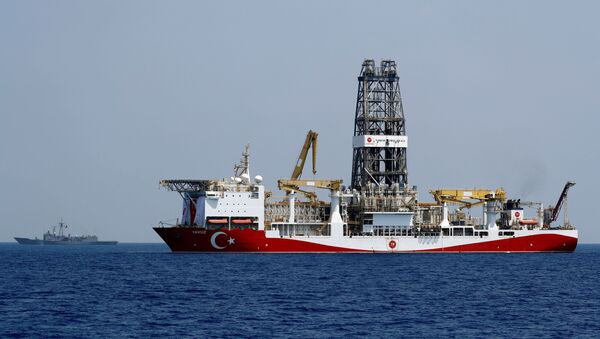In an interview with Sputnik, Turkish Cypriot Foreign Minister and Northern Cyprus presidential candidate in the upcoming elections in April, Kudret Ozersay commented on the situation around gas-field exploration by Turkey on the Cyprus shelf, Turkey's agreements with Libya, threats from the EU regarding Ankara and Nicosia's actions, as well as spoke about his programme for the development of TRNC in case of his victory in the elections.
The recently signed Turkey-Libya maritime deal can be seen as a result of the process of activation of the TRNC in the eastern part of the Eastern Mediterranean to protect its rights and interests, Kudret Ozersay believes:
"In recent years, the TRNC has abandoned its previous tactic of verbally protesting against unilateral steps by the Greek community on the island, and has begun to take concrete proactive steps. This process was ultimately marked by the signing of an agreement with Libya", the foreign minister said.
According to him, Turkey's steps have weakened Greece's position in the Eastern Mediterranean:
"Turkey's policy in the region has managed to weaken the position of Greece and Greek Cypriots, who are trying to have their direct influence on both the mainland and the island part of the shelf", he said.
However, according to Ozersay, both Libya and Turkey uphold the principle that the maritime jurisdiction of the islands may not be subject to, or may be subject to a lesser degree than the mainland. This approach was enshrined in the text of the signed bilateral agreement between Turkey and Libya:
"This is a significant point because, for example, the disagreements between Egypt and Greece are linked to how Greece considers the distance between itself and Egypt, taking the island part as a basis, rather than the mainland part", Ozersay continued.
In his view, if Turkey and Egypt sit down at the negotiating table to discuss this issue, it will be resolved, and the balance of power will take on a new dimension. Furthermore, the issue of determining the side border of territorial waters between Syria and Turkey in the eastern part of the Eastern Mediterranean will also be on the agenda at a certain stage.
"What's important here is to look at the developing picture on a larger scale", Ozersay explained.
TRNC Foreign Minister has stressed that Southern Cyprus is trying to present Turkey as an occupying country, which is not true:
"Türkiye Petrolleri Anonim Ortaklığı, the company to which we have granted the exploration license, is not operating on behalf of Turkey, but on behalf of the TRNC. Greek Cypriots, who ignore this fact, persistently try to present Turkey as an "aggressor" and "occupant", he said.
The Turkish Cypriot Foreign Minister added that they are trying to form a misconception about Turkey's actions in the EU, trying to turn European countries against Turkey, an approach that cannot be called reasonable.
According to Kudret Ozersay, the Greek Cypriots are satisfied with the current status quo and therefore seek to link the resolution of all issues to the Cyprus problem. However, the truth is that a settlement has not been reached for over 50 years.
"In my view, the solution to the Cyprus issue, as well as the path towards peace and stability in the region, lies in the establishment of cooperation on specific points. The most striking example is natural gas. An agreement on gas exploration and production should be reached as soon as possible. This kind of phased cooperation will ensure stability in the region", he said.
Commenting on the statement made by the EU High Representative for Foreign Affairs and Security Policy Josep Borrell, on the possible imposition of sanctions against Turkey due to its exploration works in the Eastern Mediterranean, Ozersay said that within the EU there is a principle of solidarity: when the question of a state's foreign policy arises, it pushes other players to show solidarity. However, this principle, unfortunately, deprives the EU of the opportunity to facilitate the settlement of international disputes involving one of its member states.
"For that reason, we do not see the EU as a reliable or neutral player in resolving the Cyprus or gas issue, since Brussels, following its internal principles, will continue to support the Greek side", he noted.
However, the Turkish Cypriot politician does not believe that the EU will implement these threats. It should not be forgotten that the world economy is built on relations of interconnectedness. Earlier, the EU was known to have attempted to impose economic sanctions against Russia over the Crimea situation, but this tactic did not bring the desired result, as EU trade relations with Russia had reached a point where they were unable to impose economic sanctions against Russia at the level they claimed. Similarly, Turkey's presence in the Eastern Mediterranean cannot be ignored.
"If French, Italian and American companies that invest in the region want to participate in the west and north of Turkey in the future, they must act in the region in a balanced and sound manner. TRNC has the resources to keep the other side from taking the wrong steps in the future", he concluded.



